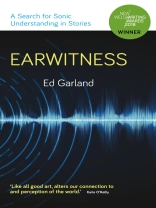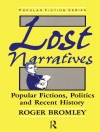In his twenties, Ed Garland came close to suicide but later discovered reading to help him cope with hearing loss and tinnitus. In this unique blend of memoir and literary criticism, right at the cutting edge of research drawing on both the literary and the medical worlds, the author reveals his own journey – through music then fiction – towards an understanding of sonic loss and, ultimately, towards healing. A genre-busting mix of literary criticism, sound studies and memoir, the essays explore what fictional sonic experiences can tell us about sound in everyday life. Written with humorous honesty about the ups and downs – mostly downs – of a young man’s mental health, this is a thoughtful and original exploration of recovey, and of literature’s ability to challenge preconceptions.
The English-language fiction classics of Wales explored include the work of Margiad Evans, Bernice Rubens, and Deborah Kay Davies. The international titles are by Annie Proulx and Samuel Beckett. Earwitness amplifies the rich connections between literature, auditory perception and mental wellbeing.
Introduction
They Can Be Heard [Grits by Niall Griffiths; Cwmardy by Lewis Jones; The Dig by Cynan Jones; Tide-race by Brenda Chamberlain]
Not Listening, Not Reading [theories of bibliotherapy, reading and listening]
Heart Songs and Audiographs [Heart Songs by Annie Proulx]
Seagulls Throughout [I Sent a Letter to my Love by Bernice Rubens; The German Numbers Woman by Alan Sillitoe]
Not One Acute Sense [Autobiograpy by Margiad Evans]
Some Filters [Tirzah and the Prince of Crows by Deborah Kay Davies; Gilead by Marilynne Robinson; ‘Radio 1’ by Samuel Beckett]
One Sound in Particular [Conclusion]
Bibliography
Ed Garland is studying for a Ph D at Aberystwyth University, researching sonic experience in contemporary fiction. He works as a copywriter. He was born in Manchester, and lived in Leicester and Bristol before settling in Aberystwyth. He was recently longlisted in the Ivan Juritz Prize.
‘Perceptive, beautiful… honest, truthful and succinct.’ Cathryn Summerhayes (Curtis Brown)
‘Intriguing, funny, learned, thoughtful and moving. Stresses the vitality of literature to the development and sustenance of the soul.’ Niall Griffiths
‘A funny and occasionally poignant exploration of the sonic dimensions of literature. Ed Garland deftly weaves reflections on his own, self-inflicted, hearing loss and tinnitus with an analysis of important but neglected textual representations of sound. This book will change the way you listen to the written word.’ Professor Kirsti Bohata, Swansea University
‘In this wise and searching book, Ed Garland creates a literary sound map of Wales [and the world], an elegy to listening and sounds he can no longer hear. Fascinating and moving. it makes the (silent) reader perceive not just sound and the act of hearing in new ways, it promotes “deep listening”. Like all good art, it alters our connection to and perception of the world.’
Kaite O’Reilly
สารบัญ
Introduction
They Can Be Heard [Grits by Niall Griffiths; Cwmardy by Lewis Jones; The Dig by Cynan Jones; Tide-race by Brenda Chamberlain]
Not Listening, Not Reading [theories of bibliotherapy, reading and listening]
Heart Songs and Audiographs [Heart Songs by Annie Proulx]
Seagulls Throughout [I Sent a Letter to my Love by Bernice Rubens; The German Numbers Woman by Alan Sillitoe]
Not One Acute Sense [Autobiograpy by Margiad Evans]
Some Filters [Tirzah and the Prince of Crows by Deborah Kay Davies; Gilead by Marilynne Robinson; ‘Radio 1’ by Samuel Beckett]
One Sound in Particular [Conclusion]
Bibliography
เกี่ยวกับผู้แต่ง
Gwen Davies is editor of New Welsh Review. As literary translator from Welsh to English, her books include Martha, Jack and Shanco by Caryl Lewis (Parthian, 2007) and The Jeweller by Caryl Lewis (Honno, 2019). She also translates the fiction of Wiliam Owen Roberts and Mihangel Morgan. Her edition of a book of gothic short stories based on folk tradition, fairy tale and mythology, Sing Sorrow Sorrow: Dark and Chilling Tales, was published by Seren in 2010.












